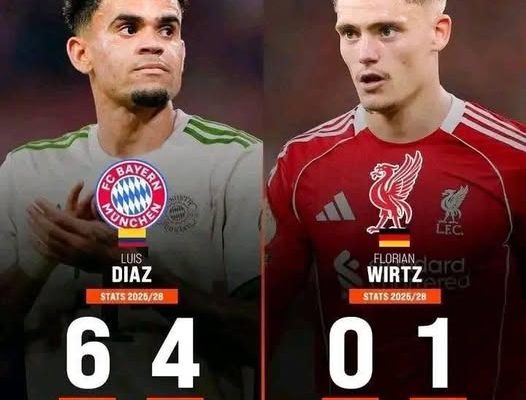Former Liverpool striker Daniel Sturridge has never been one to shy away from sharing honest, insightful opinions about his former club. In a recent interview with Sky Sports, Sturridge delved into the heart of one of Liverpool’s most pressing concerns — the absence of Colombian winger Luis Díaz. With the Reds once again striving for consistency in a fiercely competitive Premier League season, Sturridge’s comments struck a deep chord among fans who have watched the team evolve — and sometimes struggle — without one of their most dynamic attacking talents.
According to Sturridge, Díaz’s absence isn’t just the loss of a player with pace and flair; it’s a tactical and emotional blow that reverberates through the entire structure of Jürgen Klopp’s system. “For me, losing Luis Díaz is a huge loss,” Sturridge told Sky Sports. “It’s not only about what he offers with the ball at his feet — it’s the way he presses, the energy he brings to every phase of play, and the confidence he gives to the players around him. That sort of presence is not easy to replace.”
For a club built on intensity, rhythm, and relentless movement, Sturridge’s words cut to the essence of what makes Liverpool tick — and what they risk losing when a player like Díaz is sidelined. Since arriving from FC Porto in early 2022, Díaz quickly became one of the defining figures of Klopp’s new-look attack. His ability to blend South American flair with Liverpool’s high-octane pressing game made him a perfect fit for the system. He didn’t just score goals; he hunted the ball, harried defenders, and embodied the type of selfless energy that has long defined Klopp’s most successful sides.
Sturridge, who himself knows what it means to thrive under Klopp’s demanding standards, pointed out that Díaz’s defensive work rate and pressing intelligence are just as vital as his dribbling and creativity. “When people talk about wingers, they often focus on goals and assists — but Luis gives Liverpool something beyond statistics. His pressing from the front sets the tone for the entire team. Without him, that first line of pressure doesn’t bite quite as hard, and opponents have a bit more time to breathe. That can change everything,” Sturridge explained.
Indeed, Liverpool’s pressing game — once their most lethal weapon — depends heavily on coordinated effort, timing, and communication. Díaz, with his tireless running and instinct for closing down spaces, played a crucial role in ensuring the team’s high press remained synchronized. His absence leaves a gap not only on the left flank but also in the delicate balance between attack and defense.
When Díaz is fit, his energy is contagious. He chases down full-backs, tracks back to support Andy Robertson, and still finds the energy to explode forward in counterattacks. His presence allows Liverpool’s left-sided structure to thrive, creating a link between the midfield and attack that is both creative and industrious. Sturridge’s analysis echoes the sentiments of many analysts who see Díaz as a rare blend of artistry and work ethic — a player whose influence can’t be fully captured by numbers.
For Sturridge, the Colombian’s importance lies as much in mentality as in skill. “Luis plays with a kind of joy and intensity that lifts everyone,” he said. “You can see it in the way the crowd reacts when he’s on the ball. He’s unpredictable — he can go inside, outside, beat two players, and suddenly you’re in a dangerous situation. That confidence spreads through the team. When you lose that spark, it affects the rhythm of the attack.”
That rhythm has been the foundation of Liverpool’s identity under Klopp. The famous “heavy metal football” — a phrase once used by the German manager to describe his preferred style — relies on transitions and tempo. With Díaz missing, that intensity often fades at crucial moments. While players like Diogo Jota and Cody Gakpo have stepped up in his absence, none have quite replicated his unique blend of agility, aggression, and audacity.
Sturridge, who experienced both the highs and lows of Liverpool’s attacking eras, understands the subtleties of losing such a key player. “When you have someone like Díaz, the defenders are always on edge,” he said. “He stretches the pitch, forces mistakes, and gives Salah and the others more space to operate. When he’s not there, defenders can focus more on closing down the middle, and it becomes harder to break teams down. It’s not just about replacing a winger — it’s about replacing the fear factor he brings.”
Fear factor has always been a crucial part of Liverpool’s success. From the days of Sadio Mané terrorizing right-backs to Mohamed Salah’s sharp bursts behind defenses, Liverpool’s front line has been defined by unpredictability. Díaz seemed the natural successor to that legacy. His arrival injected fresh life into the squad at a time when many feared the front three’s best days were behind them. But injuries and inconsistency have since tested both his resilience and the team’s adaptability.
Sturridge, known for his own battles with injuries during his playing days, empathized with the Colombian’s struggle. “I know how tough it can be,” he admitted. “When you’re out, you feel helpless. You want to contribute, but the team has to find a way without you. It’s mentally draining — not just for the player but for the squad. The energy changes. That’s why, when someone like Luis is missing, it’s not only a tactical issue; it’s emotional.”
That emotional element is something Liverpool fans understand deeply. Díaz’s story resonates with supporters not only because of his talent but because of his spirit. Coming from humble beginnings in Colombia’s La Guajira region, he has become a symbol of passion and perseverance. Every run, every tackle, every smile feels like a reminder of what football is meant to be: joyful and relentless.
Sturridge highlighted this connection as well, praising Díaz’s mentality and its impact on the dressing room. “You can tell the lads love having him around,” he said. “He’s always positive, always giving his all. That’s infectious. In a long season, when things get tough, you need players like that — guys who lift the mood and remind everyone what we’re playing for.”
Liverpool’s current campaign has shown flashes of brilliance but also moments of inconsistency. With the Premier League becoming increasingly competitive, every detail matters. Sturridge believes that Díaz’s absence magnifies those details — particularly in how Liverpool presses and transitions. “The press starts from the front,” he explained. “If one player doesn’t press at the right moment, the whole system can fall apart. Luis was brilliant at reading those triggers. He knew when to go, when to cover, and when to force the mistake. Without him, the rhythm can be off just a second — but that second is everything in modern football.”
What Sturridge’s analysis ultimately reveals is a deep understanding of Klopp’s footballing philosophy — a system built not around individuals but around collective energy. Yet even in such a system, certain players become irreplaceable because of how seamlessly they embody the principles of the game. Díaz, for Liverpool, is one of those players.
The challenge for Klopp now is finding ways to adapt. Can Gakpo, with his strength and tactical intelligence, fill the same pressing role? Can Jota, known for his instinct in front of goal, replicate the defensive effort Díaz brings? These are the questions Liverpool must answer as they aim to stay in contention across multiple competitions.
Sturridge offered a note of optimism despite his concerns. “The beauty of Liverpool is that they’ve always found ways to evolve,” he said. “Even when they’ve lost key players, others have stepped up. You think of when Mané left — everyone wondered how they’d cope, and they adjusted. But it takes time, and in that period, someone like Díaz being out can make the difference between a good team and a great one.”
That difference is something Liverpool have learned the hard way. The fine margins between winning and falling short often depend on small details — a press that comes a second late, a winger who doesn’t stretch the defense, a spark of creativity that turns a draw into a win. Díaz, with his unique blend of intensity and imagination, often provides those small but vital moments.
For Sturridge, his admiration for Díaz goes beyond analysis. There’s a clear respect — one rooted in understanding what it takes to wear the Liverpool shirt. “It’s not easy to play for Liverpool,” he reflected. “The expectations are massive, the demands are constant. But Luis has embraced it from day one. He plays with freedom, but he also plays with purpose. That’s rare. And when you lose a player like that, you feel it — not just in results but in identity.”
As Liverpool look to the months ahead, with hopes of competing on multiple fronts, the return of Luis Díaz will be eagerly awaited. His recovery and reintegration could be pivotal to restoring the rhythm that defines Klopp’s best teams. For now, the Reds must adapt, relying on depth and tactical adjustments. But Sturridge’s words serve as a reminder that some players do more than just fill a position — they define a style.
In a sport often obsessed with statistics and systems, Daniel Sturridge’s reflection brings a more human dimension to the discussion. Football, after all, is played not only with tactics but with spirit — and few embody that spirit quite like Luis Díaz. For Liverpool, his absence is more than a lineup change; it’s a void in energy, emotion, and expression.
And for a club whose identity has always been tied to passion and perseverance, that void will be felt until the Colombian’s smile once again lights up Anfield, his relentless pressing reignites the team’s rhythm, and his fearless creativity reminds the Premier League why he’s one of its most irreplaceable stars. Until then, as Daniel Sturridge so aptly put it, Liverpool will be missing more than a winger — they’ll be missing a heartbeat.



